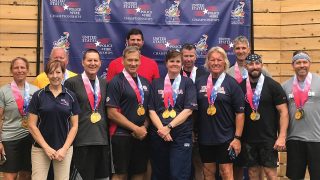
Several years into my career as a police officer, I began experiencing depression, nightmares and mood swings. My level of awareness swung between irrationally heightened and frighteningly numb. My work suffered. Where I used to be proactive and busy with traffic stops, encounters and building checks, I became reactive, just taking dispatched calls and rarely initiating anything. I no longer took overtime shifts, stopped caring how my uniform looked and used all my sick time. My personal life began unraveling, too. I lost interest in things I’d always enjoyed, gave up on working out and rarely left my home except for work. To avoid being labeled “weak” at work, I secretly sought medical help, but no one associated PTSD with police work, so I was diagnosed with depression and prescribed medications that actually made things worse. In desperation, I called our “confidential” employee assistance program. The EAP accused me of exaggerating my symptoms and said they’d have to alert my chief if I admitted to taking antidepressants.
At a training course in the mid-1990s, an instructor asked us to complete a test on police stress. After catching sight of my score, the officer seated closest to me whispered jokingly, “You should be dead.” He was joking because, in the 1990s, cops were supposed to be too tough to have emotional reactions to their work. Off-color jokes, drinking and, most of all, silence were the only acceptable responses to burned bodies, mayhem and dead babies. So, I sucked it up, managing to keep it together for my shifts and then falling apart at home alone.
Years later, a psychologist told me the development of PTSD is like trying to hold a beach ball under water — you struggle to keep it down and when you inevitably lose your grip, the ball explodes up and practically takes your head off. To maintain my social mask, I’d been struggling to stuff down a ball full of emotions and symptoms. I finally lost my grip when a cherished friend was killed in the line of duty.
The resulting explosion did almost take my head off.
I felt like I was falling down a hill backward. I was having flashbacks, avoiding public places, waking up a dozen times a night from violent, terrifying dreams, and isolating for days or weeks at a time. Even though I often felt completely numb inside, I could be sparked to irrational anger or wallowing anguish for no reason, often in the same hour. I was fearful and hypervigilant. I turned into a hybrid of a sloth, a snarling rabid wolf and Eeyore, the donkey from Winnie-the-Pooh.
When I did leave my house, I engaged in risky behaviors like driving too fast and tempting fate where a rational person wouldn’t. Even my core beliefs began to change. I began to see people in two categories: They were either a threat or they were blocking my view of a threat. I was angry too often — wrap rage, apple core rage, coffee-cup-lid rage — and started filling my sentences with profanities. One of my brothers joked that I needed a DEFCON-type T-shirt to warn people about my mood levels.
I finally asked my supervisors for help, telling them that work stress was getting the better of me. They listened impatiently before accusing me of shirking my duties and looking for unwarranted time off. Feeling lost and abandoned, I published three emotional essays. Still, except for a note from a supervisor acknowledging my writings and suggesting I call our EAP, no one reached out to me, not even members of our police stress team.
In the midst of struggling with the “depression,” I was physically injured on patrol. When my chief insisted on an involuntary disability retirement, the career I loved was terminated against my will. I was unceremoniously shoved out of “the brotherhood” where I’d spent my entire adult life. My years of service to my community were not recognized with a party or even an official farewell, just a call telling me I didn’t “need to bother” coming to work anymore.
The “depression,” forced retirement at age 37 and physical pain from injuries that wouldn’t heal swamped me. Because of my career, my past contained nothing but monsters. Without my career, my future contained nothing, period. My soul felt empty, while my head and heart were overflowing with filthy trash that bubbled up from a brimming cauldron. My superpower became a total lack of affect. I shielded everyone from my deepest thoughts. I spent a lot of time seesawing between figuring out how to commit suicide and figuring out how to stop myself from committing suicide. Many friends suggested I was “just depressed” and needed to “stop thinking about it,” and when I didn’t “just shake it off,” they stopped coming around. Others helplessly watched me withdraw from the world. I let them think it was entirely due to the relentless physical pain. Only my dog knew the truth, and when things were at their worst, I hugged her tightly to me while I sat on the floor with a loaded gun and a three-minute egg timer, letting her lick the tears from my face while I told myself that I could pull the trigger when the egg timer went off if I still felt the need.
“Hope” was no longer in my vocabulary.
A few months after retiring, I was finally diagnosed with PTSD. My department was aware of my PTSD diagnosis but offered no support. I used my personal insurance and savings for treatment. I attended week-long residential workshops for first responders at On-Site Academy and the West Coast Post-trauma Retreat in California. I practically memorized Allen Kates’ book CopShock. I embraced treatments like eye movement desensitization and reprocessing (EMDR), more medications, more therapy, a service dog and meditation. Those tools helped me better understand and accommodate the PTSD, but I came to realize that unless getting hit by a bus could be considered a cure, PTSD can’t be cured — it can only be managed.
But living with PTSD is not the same thing as having a life. It’s a battle to maintain real courage under fake danger. And being torn between wanting to enjoy memories and being tormented by them is maddening. Sadly, when you stuff down the bad memories, you stuff down the good ones, too. When you dull the emotional pain, you dull the joyful moments, too. So, I become an empty shell of the person I used to be.
In recent years, police PTSD has received more attention and more respect. Officers are receiving mental health care from their departments, and PTSD is now being treated as a line-of-duty injury. While it’s heartening to witness the positive changes, it’s been difficult to be excluded from the benefits that seem to be reserved for the younger generation. Recently, when a Massachusetts officer retired due to PTSD with an exclusive pension that generously exceeded the statutory standard, I met with the politician who had spearheaded it. He said, “All cops have some level of PTSD,” and since “you didn’t have your best friend’s brains splashed across your face,” my PTSD was not remarkable.
Last year, a friend told me about a PTSD treatment developed by Dr. Sean Mulvaney in Annapolis. After some reassuring research, I secured an appointment and a hotel reservation. I drove nine hours clutching a credit card to pay for a stellate ganglion block (SGB) procedure.
Dr. Mulvaney’s professional, direct and friendly manner cultivated the trust I needed to allow him to stick a long needle into my neck. After a period of rest and some evaluations, I was released. Within an hour, I felt different. It was as though my head had been a noisy, bustling, overcrowded room and suddenly the people left, leaving an open, clear, quiet sensation. I felt lighter — not physically, but mentally, the way I used to feel when I finally arrived home after a long shift. I even felt spiritually taller because the weight my shoulders had carried for so long was lessened.
Having the PTSD under control means I can be myself again, whoever that may be, and I have begun waking up for my life rather than to my life.
There were a few minor side effects that lasted a few hours, but the changes were extraordinary and immediate. I caught myself smiling for no reason. Although I normally went to bed early to escape the chaos in my head, that night I stayed up until I was physically tired. In the morning, I was shocked that I felt rested and hadn’t had a single nightmare or been startled awake from an insignificant noise. As I prepared for the journey home, I had a persistent, strange, elusive feeling I couldn’t shake. I finally identified it as hope, something I hadn’t felt in two decades. That’s when I realized that my service dog had been treating me differently since I’d had the procedure. He’d recognized the transformation instantly.
At home, I surprised myself by accepting the first social engagement that was offered. Friends said they could hear a difference in my voice. I slept through the night again, and again, and again. I continually smiled without provocation. The clear-headed feeling remained; the chaos in my head had settled, replaced by a quiet composure. I no longer lost my temper over trivial things, and the sensation of being constantly emotionally overwhelmed was gone.
But the procedure did not take away the PTSD; it only quieted it. Whereas most of the symptoms used to strike many times a day, they now only occur once or twice a week, some only once or twice a month. I am still susceptible to the triggers that used to overwhelm me, but now my reactions are muted and pass when I acknowledge them. There’s peace in knowing the symptoms won’t last, and power in realizing I can better control my reactions to them.
Continual hope has replaced constant thoughts of suicide. I am rested because I sleep through the night; the few times my service dog has awakened me, I assume he sensed a nightmare but I have no memory of one — a far cry from waking almost every night covered in sweat, with tense muscles and clenched teeth, unable to fall back asleep as the nightmare spun through my head like a movie reel. In public, I am situationally aware — like a cop — rather than paranoid and hypervigilant, and when my service dog steps between me and others, I realize I don’t need that safety barrier because I can actually breathe in the midst of other people.
I’m still figuring out which behaviors are continuing from habit rather than from the PTSD symptoms that linger. And I still have to deal with the daily physical pain from the physical injuries. Discovering how tangled the PTSD and physical pain were is staggering. In some ways, the PTSD masked the pain by upstaging it, but in other ways, it magnified the pain by heaping more stress onto my body. Unfortunately, since the procedure, there have been times when I’ve longed for the numb emptiness of PTSD that veiled the physical pain.
I have always thought that having some control over the PTSD would make me the person I used to be. Now I know that I am no longer who I was and will never be what I was going to be. But now that there’s space in my head and a desire to move forward, I’m starting to build a new me. It is a struggle to figure out who I am, what I will enjoy, what makes me happy, how I will live and how I will love. Having the PTSD under control means I can be myself again, whoever that may be, and I have begun waking up for my life rather than to my life. I, not the PTSD, can dictate how I move through the world.
So, six months after the SGB procedure, I am still unraveling the snarled knots that muddled the PTSD and the physical pain, and trying to accept the pain as its own entity. In that endeavor, I have posted a single quote on my normally blank refrigerator door from a quadriplegic man named Chad Hymas: “Let go of the illusion that it could have been any different.”
There’s something to be gained from what the procedure erased. When I find out what it is, I’ll be able to let go of the illusion.
As seen in the September 2020 issue of American Police Beat magazine.
Don’t miss out on another issue today! Click below:





